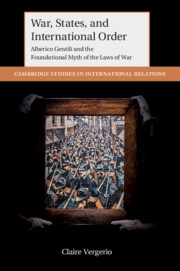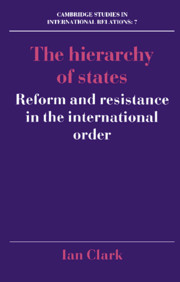War, States, and International Order
Who has the right to wage war? The answer to this question constitutes one of the most fundamental organizing principles of any international order. Under contemporary international humanitarian law, this right is essentially restricted to sovereign states. It has been conventionally assumed that this arrangement derives from the ideas of the late-sixteenth century jurist Alberico Gentili. Claire Vergerio argues that this story is a myth, invented in the late 1800s by a group of prominent international lawyers who crafted what would become the contemporary laws of war. These lawyers reinterpreted Gentili's writings on war after centuries of marginal interest, and this revival was deeply intertwined with a project of making the modern sovereign state the sole subject of international law. By uncovering the genesis and diffusion of this narrative, Vergerio calls for a profound reassessment of when and with what consequences war became the exclusive prerogative of sovereign states.
- Explores the origins of our modern understanding of warfare in international law
- Combines international relations, history, and international law to cast new light on an old debate
- Formulates and deploys an intellectual historical method for the study of the reception of great thinkers in international relations
Reviews & endorsements
‘Claire Vergerio’s book is a tour de force. She reveals the deep history of a myth upon which so much of the field of international relations is born, and from it our understandings of sovereignty, war, and the leap to the modern world. By exposing the readings and cult of Alberico Gentili as the source of this vision, she clears the way to explore different orders for our times, alternatives with their own narratives.’ Jeremy I. Adelman, Princeton University
‘Claire Vergerio has written a superb account of the ideas and reception of the important jurist Alberico Gentli. Spanning centuries, her acute analysis traces the development of his thought, and the impact it had on a variety of debates and discourses about the morality and laws of war, from the early modern era to the twentieth century. Theoretically innovative and historically rich, War, States and International Order is an impressive work of scholarship.’ Duncan Bell, University of Cambridge
‘Its remarkable erudition and meticulous attention to detail make War, States, and International Order an outstanding piece of scholarship, situated where the concerns of legal history, history of political thought and international relations intersect.’ Jens Bartelson, Perspectives on Politics
‘Claire Vergerio’s remarkable book convincingly reconstructs why and how Alberico Gentili has become from the 1870s the pillar of the foundational myth of the laws of war. … Vergerio’s book is a useful guide for blazing, we hope, further trails towards a broader understanding of the legal right to use force in the current international order.’ Luigi Lacchè, Journal of the History of International Law / Revue d'histoire du droit international
‘The book is a very solid work of intellectual history … International lawyers will gain new insights on the canonical ideas of the field, and the book should also interest students of international relations for the light it sheds on that discipline’s own origins.’ Will Smiley, Political Science Quarterly
‘This book is a commendable achievement that contributes to a deeper understanding of the origins of international legal norms. This text will certainly be essential reading for those interested in the history of international law, early modern political thought, and the value of merging contextual and reception theory.’ Matthew Cleary, Grotiana
‘… a masterpiece of scholarly exploration and discovery … a tour de force of research and analysis, and a major contribution to the historiography of international relations and international law.’ Steven M. Schneebaum, The Texas National Security Review
‘An impressively researched and beautifully written book.’ Elizabeth Grimm, The Texas National Security Review
‘Claire Vergerio’s important book … is one of the most fruitful and original appeals stemming from the historical turn in international relations (IR) and international law (IL).’ Juan Pablo Scarfi, The Texas National Security Review
‘Vergerio is meticulous in her analysis and claim-making, carefully reconstructing her historical subjects while navigating through the controversies in intellectual history, historical IR, and criticisms from Anne Orford and others regarding the alleged trade-offs of historicizing international law. Nor is she afraid to challenge prominent scholars in these fields as she has read through thousands of citations and historiographies in multiple languages to piece together the chronologies and underlying myths associated with the framing of legal rights for waging war. … While the monograph has received well-deserved praise in the field of (historical) IR, it is equally important, if not more so, for the histories of international law, intellectual history, and international history.’ Boyd van Dijk, Cambridge Review of International Affairs
‘Vergerio provides us with fascinating illuminations of side-lined or even forgotten aspects of the history of international law, demonstrating impressive scrutiny and ability to confidently manoeuvre amongst the disciplines of history, philosophy, law and international relations.’ Marie-Luisa Frick, Cambridge Review of International Affairs
‘For any scholar or practitioner interested in international law, legal history, or the intellectual foundations of the modern state system, War, States, and International Order is a fascinating and enlightening read.’ Emma Norton, Cambridge Review of International Affairs
‘… a profound, skillfully crafted, delightfully irreverent and iconoclastic account of canon and canonicity that deftly navigates a dazzling maze of historical sources, historiographical debates, methodological polemics, and disciplinary boundaries in order to posit the seldom-asked questions that the canon silences.’ Rotem Giladi, The Cambridge Review of International Affairs
Product details
March 2024Paperback
9781009107594
318 pages
228 × 151 × 17 mm
0.47kg
Available
Table of Contents
- 1. Context, reception, and the study of great thinkers in International Relations
- Part I. Gentili's De iure Belli in its Original Context:
- 2. Alberico Gentili's De iure Belli: Between Bodin and the reason of state tradition
- 3. Grounding an absolutist approach to the laws of war
- Part II. Gentili's De iure Belli and the Myth of 'Modern War':
- 4. Unearthing the 'true founder' of international law
- 5. Constructing the history of the 'modern' laws of war
- 6. Carl Schmitt and the entrenchment of the myth.







